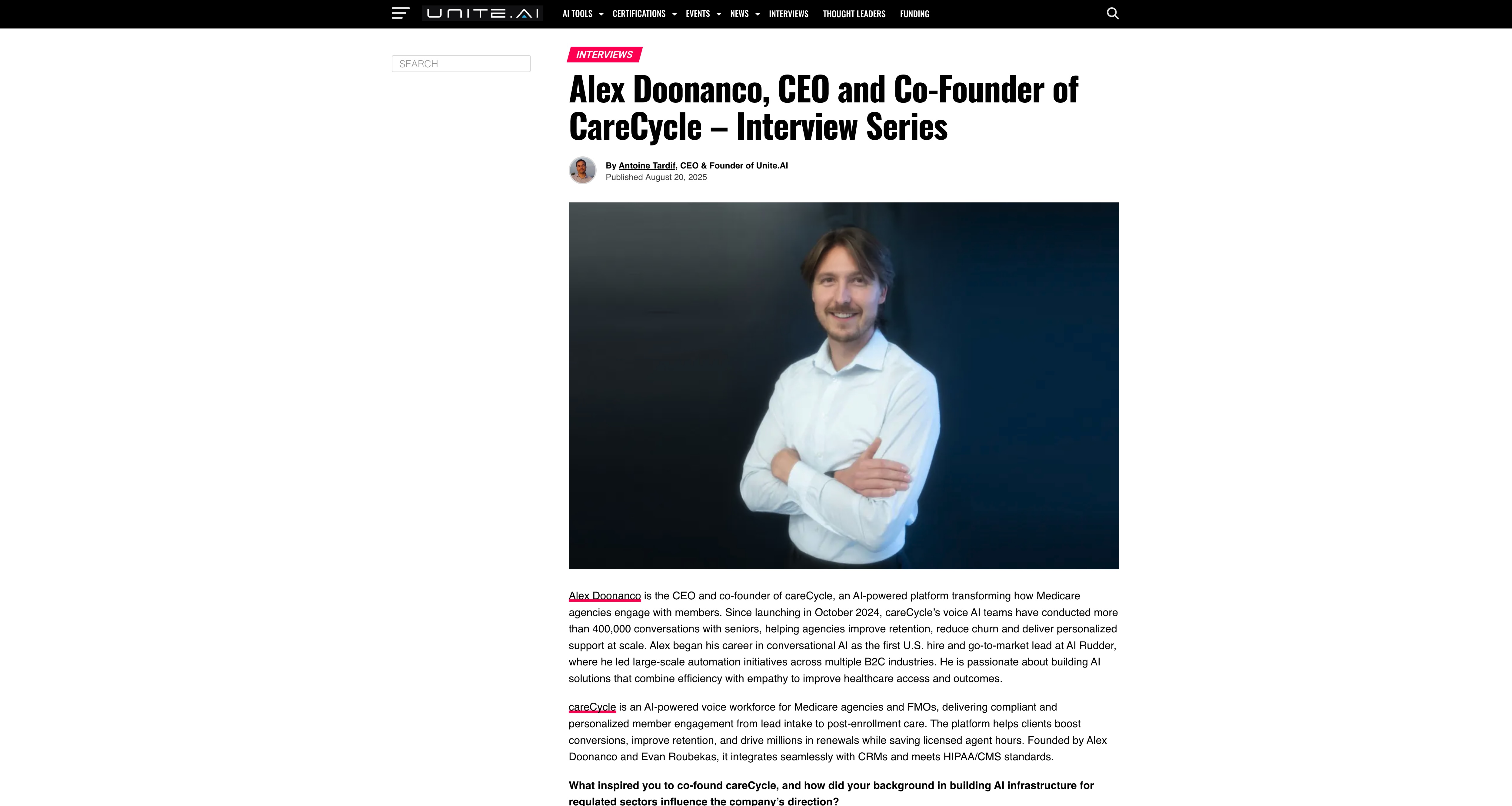Originally posted on Unite.Ai; August 20, 2025.
By Antoine Tardif, CEO & Founder of Unite.AI
Alex Doonanco is the CEO and co-founder of careCycle, an AI-powered platform transforming how Medicare agencies engage with members. Since launching in October 2024, careCycle’s voice AI teams have conducted more than 400,000 conversations with seniors, helping agencies improve retention, reduce churn and deliver personalized support at scale. Alex began his career in conversational AI as the first U.S. hire and go-to-market lead at AI Rudder, where he led large-scale automation initiatives across multiple B2C industries. He is passionate about building AI solutions that combine efficiency with empathy to improve healthcare access and outcomes.
careCycle is an AI-powered voice workforce for Medicare agencies and FMOs, delivering compliant and personalized member engagement from lead intake to post-enrollment care. The platform helps clients boost conversions, improve retention, and drive millions in renewals while saving licensed agent hours. Founded by Alex Doonanco and Evan Roubekas, it integrates seamlessly with CRMs and meets HIPAA/CMS standards.
What inspired you to co-found careCycle, and how did your background in building AI infrastructure for regulated sectors influence the company’s direction?
I first began working in voice AI in 2022, deploying systems across industries like finance, legal, and healthcare. Those experiences gave me a clear view of both the possibilities and the limitations of generic AI in highly regulated spaces. What I saw repeatedly was that traditional voice AI systems were built to showcase technology, not to solve meaningful industry problems. They were transactional, lacked memory, and were risky in environments where compliance and empathy were critical.
In Medicare, those weaknesses are amplified. Seniors were signing up for plans and then often left without proactive support, while agencies were losing revenue because members churned within the first 90 days. I co‑founded careCycle to close that gap. My background in regulated AI taught me to think about compliance and security from the very first line of code. That approach enabled us to build careCycle as a platform that not only enhances member experiences but also meets the stringent requirements of HIPAA and CMS.
How did participating in Y Combinator help shape careCycle’s early growth and validate the need for better post-enrollment automation in Medicare?
Participating in Y Combinator was transformative for careCycle. The program created an environment that encouraged us to move faster, focus on our core mission, and connect deeply with other founders solving ambitious problems. For careCycle, that meant refining our approach to Medicare post‑enrollment engagement and rapidly testing our solution with real agencies.
YC also provided invaluable mentorship and access to a network of investors and early adopters who understood the scale of the problem we were addressing. It validated that the market opportunity was massive and gave us the resources and confidence to bring a purpose‑built, compliant AI solution to an industry that desperately needed it.
How do careCycle’s AI voice teams manage different parts of the member journey, including onboarding, plan navigation, and renewals?
We designed careCycle’s AI voice teams to function like a group of always‑available specialists, each focused on a specific stage of the member journey. During onboarding, one AI agent greets the member by name, confirms their information, and schedules any follow‑up appointments with a licensed human if needed. During plan navigation, another AI agent answers routine questions about benefits, co‑pays, and coverage details, and immediately escalates anything sensitive to a licensed agent.
Post‑enrollment is where careCycle has the greatest impact. Our AI agents run proactive check‑ins, reminders, and renewal outreach while remembering past interactions. If a senior previously asked about a prescription cost or a primary care doctor, the AI can follow up with context, creating a conversation that feels genuinely personal. Behind the scenes, our orchestration system ensures that licensed agents only step in where they add the most value, while the AI handles the high‑volume, repetitive interactions. This approach allows agencies to continuously engage every member without adding staff, which dramatically improves retention.
Can you explain how careCycle maintains HIPAA compliance while handling hundreds of thousands of conversations?
Compliance has been a core pillar of our platform from the start. Every call we process is handled through secure, onshore infrastructure with encrypted storage and audit‑ready logging. Before any protected health information is shared, our AI performs multi‑factor identity verification to confirm the member’s identity. Our conversational flows are carefully designed to align with CMS guidelines, and every outbound contact follows TCPA requirements.
Equally important, our platform incorporates a human‑in‑the‑loop system for high‑risk or sensitive inquiries. If a member asks a question that could trigger regulatory exposure or requires a licensed decision, the AI flags the interaction immediately and either escalates to a human in real time or schedules a follow‑up from a licensed agent. This approach allows us to handle hundreds of thousands of conversations without compromising security or regulatory integrity.
How does your system retain memory of previous conversations and tailor future interactions to each individual member?
One of careCycle’s most powerful capabilities is its ability to create a secure, contextual profile for each member. This profile allows our AI agents to recognize a returning caller instantly, greet them by name, and recall the details of previous conversations. If a senior called last month with a question about their pharmacy benefit or a referral, the AI can reference that interaction naturally and either follow up or close the loop.
This continuity is more than a technical feature. It builds trust. Seniors feel like they are interacting with a team that knows them, understands their situation, and is proactively looking out for their needs. That sense of familiarity and reliability drives higher retention, better satisfaction, and ultimately stronger outcomes for both members and agencies.
Could you walk us through a typical onboarding process with careCycle — both from the member’s perspective and the agency’s?
From a member’s perspective, onboarding with careCycle is effortless. They can receive a proactive welcome call or dial in at any time. The AI greets them by name, confirms their information, and answers basic questions about their plan. If they need a human touchpoint to discuss complex coverage decisions, the AI performs a smooth warm transfer to a licensed agent. Members leave that first interaction feeling supported and confident, rather than wondering who to call when questions arise.
From the agency’s perspective, onboarding is designed to be as seamless as possible. We integrate with their CRM or phone system, pre‑screen leads for eligibility, and start automating post‑enrollment engagement in a matter of days. This allows agents to spend less time on repetitive calls and more time on revenue‑generating activities, while careCycle ensures no member is left behind. Our clients consistently see improved 90‑day retention, lower cost per acquisition, and measurable increases in lifetime value.
Why is a purpose-built solution essential for Medicare agencies compared to repurposing off-the-shelf voice AI?
Medicare is a uniquely complex and highly regulated space, and generic voice AI is not designed for it. Off‑the‑shelf tools may handle basic automation, but they lack the compliance infrastructure, memory, and empathy that seniors expect and regulators demand. Using a generic solution in this environment can create real risk, from data handling to TCPA violations, and it rarely improves retention in a meaningful way.
We built careCycle specifically for Medicare and ACA plan support. Our platform understands the nuances of the member journey, maintains full compliance, and integrates directly with agency workflows. That purpose‑built focus allows us to deliver not just automation but measurable outcomes in member retention and revenue.
What are some of the biggest technical or compliance challenges you had to overcome in designing the platform?
One of the biggest challenges was orchestrating multiple AI agents across an extended member journey. Each agent needed to maintain its own specialization for onboarding, plan navigation, and renewals while sharing context with the others so that the experience felt seamless to the member. Solving that required significant investment in multi‑agent orchestration and secure, persistent memory that respects HIPAA requirements.
The second challenge was embedding compliance into the system without slowing it down. We had to build features like identity verification, onshore data processing, audit logging, and human‑in‑the‑loop escalations in a way that still delivered fast, conversational interactions. Balancing regulatory rigor with an intuitive member experience was complex, but solving it is what makes careCycle truly enterprise‑grade.
Where do you see careCycle heading next — are there plans to expand into other areas of healthcare or adjacent industries?
In the near term, we are focused on scaling careCycle across Medicare and ACA markets, adding multilingual support, and deepening our CRM integrations to make adoption even easier for agencies. We are also exploring analytics dashboards that give agencies clear visibility into member engagement and retention trends.
Over the longer term, the same infrastructure we have built for Medicare can serve adjacent healthcare markets and other regulated industries where member engagement and compliance are critical. Our vision is for careCycle to become the default AI engagement layer for organizations that need to build trust at scale while managing thousands of sensitive interactions every day.
What advice would you give other AI founders looking to build in highly regulated sectors like healthcare?
My biggest advice is to start with the problem rather than the technology. Too many AI projects chase novelty instead of solving real pain points. In regulated sectors, trust and compliance are non‑negotiable, and they must be built into the DNA of your product from the start.
Immerse yourself in the domain until you understand not only the regulations but also the human side of the experience. Design for human‑in‑the‑loop oversight, focus on measurable outcomes, and think about how your technology can create reliability and delight, not just efficiency. Founders who do this will build solutions that thrive in industries where others fail.
Thank you for the great interview, readers who wish to learn more should visit careCycle.
Simple, practical insights. Straight to your inbox.




